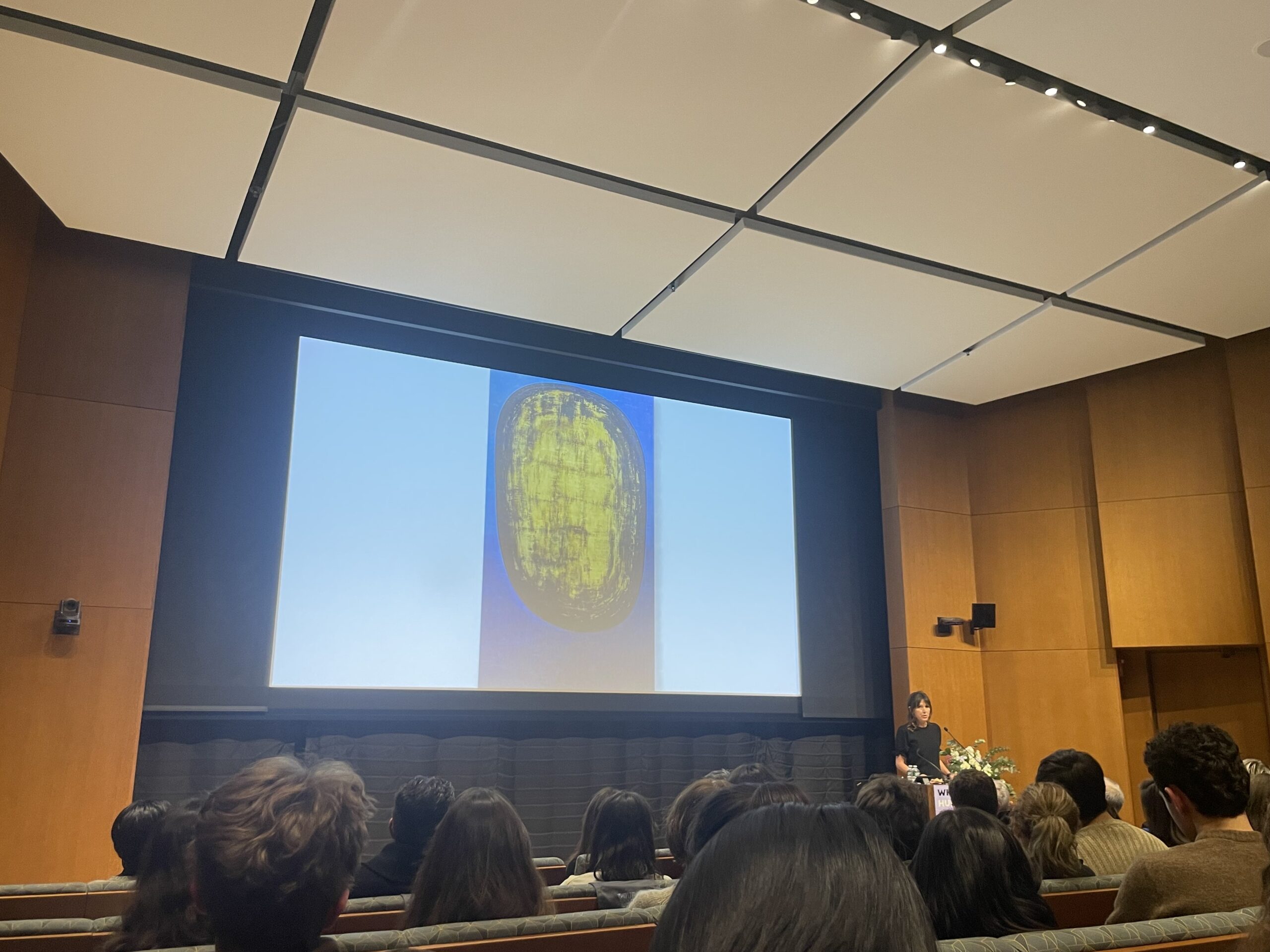“Forget about politics, and think about art”: Rachel Cusk speaks at Finzi-Contini lecture at Whitney Humanities Center
Cusk, an acclaimed British novelist and essayist, spoke to Yale students on Thursday evening in the basement of the Humanities Quadrangle.

Adele Haeg, Contributing Photographer
This Thursday, The Yale Review and the Whitney Humanities Center invited Rachel Cusk — a prolific British novelist, memoirist and essayist — as this year’s Finzi-Contini lecturer.
At the event, Cusk delivered a reading of her unpublished essay, “Into the Light: A Woman Uncovered.” The essay, she said, is a semi-biography of Norwegian modernist artist Anna-Eva Bergman.
“I think Yale students should know that this lecture will be literary history in the making!” said Megan O’Donnell, associate communications officer at the Whitney Humanities Center. “Yale students have a chance to witness the making of this literary history firsthand.”
Emily Cox GRD ’25, a doctorate student in art history, explained why she thought Cusk chose Bergman as her muse.
Cox sees parallels between Cusk’s literary art and Bergman’s visual art.
“She and the painter share an interest in hollowing out form and seeing what can emerge from spaces of absence or reflection — whether that’s the void of the narrator, as in Cusk’s work, or in the geometric and metallic abstractions that so often figure in Bergman’s work,” wrote Cox in an email.
Cusk’s essay bends genre; it is neither fiction nor nonfiction, and neither literature nor philosophy.
Cusk is an innovator. She famously said in a 2018 interview with The New Yorker that she didn’t think character existed anymore.
“I’m trying to see experience in a more lateral sense rather than as in this form of character,” said Cusk, to her interviewer. “Which, as I said, I don’t actually think is how living is being done anymore.”
The Finzi-Contini Lecture is the pride of the Whitney Humanities Center: they have hosted renowned scholars of all manners — from Italian medievalist and philosopher Umberto Eco to Percival Everett, whose novel “James” won the National Book Award in 2024.
According to O’Donnell, Cusk was an “ideal” speaker for the Finzi-Contini Lectures due to the “intellectually incisive and formally imaginative nature” of her writing.
“Her writing often thwarts expectations of traditional narrative structures in ways that invite readers to engage in a more focused form of attention,” said O’Donnell.
The Finzi-Contini lectureship was endowed in 1990 by Guido Calabresi ’53 LAW ’58 — U.S. circuit judge and former dean of the Yale Law School — and his brother, Dr. Paul Calabresi ’51 MED ’55, in honor of their mother, Bianca Maria Finzi-Contini.
In an email, Diane Berrett Brown, deputy director of the Whitney Humanities Center wrote that the Finzi-Contini lectureship is especially “meaningful” to the Whitney Humanities Center, because of the “abiding and generous support” of the Calabresi family.
Cajetan Iheka, director of the Whitney Humanities Center, introduced the lecture by honoring “Bianca’s life and example.”
Finzi-Contini and her husband were involved in the resistance against Italian dictator Benito Mussolini’s regime. They fled fascist Italy for New Haven in 1939. Because Yale College would not admit female undergraduates for another 30 years, Finzi-Contini studied French at the Graduate School instead.
There, she earned her master’s degree in French and eventually went on to teach at Albertus Magnus College in New Haven. Finzi-Contini’s gravestone at the Grove Street Cemetery is engraved, “Wife, Mother, Teacher, Scholar.”
Before she delivered her reading, Cusk promised the audience, “I’m going to forget about politics, and think about art.”
She invited the audience to do the same.
Cusk acknowledged that art is always political. Politics is everywhere right now, she said. But she also cited the power of attention; where we direct our attention is how we assign power to ideas, voices, or characters, she suggested.
According to Iheka, Cusk and Finzi-Contini represent freedom in their art similarly.
“Refusing the demand of fascism, [Finzi-Contini] carved out what our distinguished lecturer today describes as a structure of freedom in her novel ‘Second Place,’” said Iheka. “In the pursuit of this freedom … Bianca chose a new life in the U.S. with her family: the life of the mind, of devotion to family, and of a transcendental freedom.”
During the Q&A portion of her lecture, Cusk briefly broke her promise and spoke about the manifestations of politics in art and literature.
Perhaps the character does exist again, Cusk remarked to a laughing audience.
“I know I said I wouldn’t talk about politics, but in the context of dictatorship, for instance, that’s character. That’s the force of character.”
A version of Cusk’s lecture will be published in the summer issue of The Yale Review.







